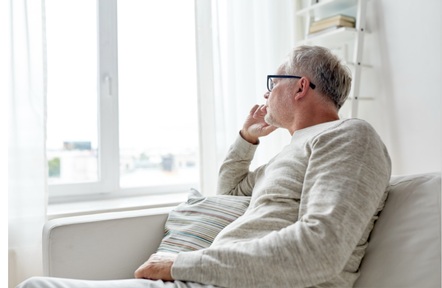Nearly 9 million older people feel less confident attending hospital appointments now than before the pandemic, says Age UK
With fifty four per cent of over 60s feeling less confident attending a hospital appointment and almost six million feeling less confident going to a GP surgery than before the pandemic, Age UK worries how many people can "bounce back" from Covid-19.

Age UK says the impact of the pandemic on the health and wellbeing of some older people in early 2021 is so demonstrably severe it has left "deep physical and emotional scars" on the older population. The adverse effect may prove long lasting in many cases, or even irreversible, with big implications for the NHS and social care in the months and years to come.
Age UK who carried out the research during January and February 2021 also found nearly four and a half million people over 60 said they couldn’t walk as far with around four million people reported they were living in more physical pain.
Caroline Abrahams, Age UK’s charity director, said: “We’re all hoping that this nightmare pandemic is finally in retreat, but even if it is millions of older people will still be left coping with the difficult physical and mental after-effects of all they have endured.
“Our research found that earlier this year, immobility, deconditioning, loneliness, and an inability to grieve as normal, were leaving deep physical and emotional scars on a significant proportion of our older population. It’s too soon to know for certain how many older people can ‘bounce back’ from the pandemic but at the very least it will be tough, and they are going to need all the help they can get.”
'Millions of older people face long periods on hospital waiting lists, often in considerable pain'
Nearly half of respondents living with a long-term health condition (around three million) were living with more physical pain since the start of the pandemic while 38 per cent of older carers (nearly 860,000) were in more physical pain since the start of the pandemic.
The research also indicated that 27 per cent of people from ethnic minorities were also feeling less confident about getting out and about, accessing health services or receiving support at home, when compared to 19 per cent of their white counterparts and 26 per cent of older ethnic minority people felt less confident leaving the house by themselves since the start of the pandemic, compared to 17 per cent of white older people.
“Sadly, millions of older people face long periods on hospital waiting lists, often in considerable pain," says Ms Abrahams. "As well as giving hospitals the extra funding they are asking for in order to reduce these lists as fast as possible, the government must also look at what more can be done by GPs and community health services to support older people while they wait for their surgery and increase their funding accordingly. Making sure these older people can access effective pain relief, for example, is a moral and medical imperative."
'Please do keep supporting the older people in your lives'
The research also found evidence of accelerated cognitive decline. Alongside prolonged periods of isolation, reduced social contact, and limited mental stimulation, over three million said they were finding it harder to remember things since the start of the pandemic.
The pandemic also had an impact on mental health. Some who were already living with a mental health condition had seen their symptoms exacerbated (in some cases a relapse had been triggered after many years).
Many others over 65s were experiencing anxiety, low mood and depression for the first time with 36 per cent (around six million) said they feel more anxious since the start of the pandemic and 12 per cent of people aged 60 plus feel they are less independent now than at the start of the pandemic with nearly half (around seven million) saying they are feeling less motivated do the things they enjoy since the start of the pandemic.
“Meanwhile, the rest of us should bear in mind that it may take many older people quite some time to rebuild their confidence and capacity, and we all have a part to play in helping them with this.
"Our message to the public this summer is 'please do keep supporting the older people in your lives',” advises Ms Abrahams.
Age UK is calling on the government to supply enough additional resources to meet older people’s increased, pandemic-related needs including physical and mental health as well as social care services.
If you are worried about the effect the pandemic has had on an older family member or for more information and advice, call Age UK’s free, confidential Advice Line. Open 365 days a year from 8am-7pm, the Advice Line is available by calling 0800 169 6565.
Latest News
 29-Jul-24
Dementia Bus gives carehome.co.uk staff insight into life with dementia
29-Jul-24
Dementia Bus gives carehome.co.uk staff insight into life with dementia
 27-Jul-23
UK's top home care agencies in 2023 revealed
27-Jul-23
UK's top home care agencies in 2023 revealed
 30-Nov-22
A quarter of older people keep their falls secret from family
30-Nov-22
A quarter of older people keep their falls secret from family
 29-Nov-22
'Covid-19 has not gone away' say terminally ill
29-Nov-22
'Covid-19 has not gone away' say terminally ill
 28-Nov-22
IT consultant who received poor care opens 'compassionate' home care business
28-Nov-22
IT consultant who received poor care opens 'compassionate' home care business